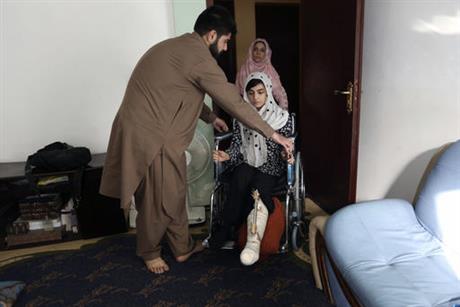KABUL, Afghanistan (AP) — Breshna Mosazai remembers the day of the deadly attack two months ago on the American University in Kabul. She remembers lying still on the corridor floor and playing dead, pushing the agony of the gunshot wounds out of her mind as heavily armed gunmen stalked around the campus, looking for people to kill.
That day changed her life forever and forced the 26-year-old Afghan law student to put her dreams of a future and a career on hold.
The Aug. 24 rampage went on for what seemed like an eternity as the attackers shot at students with automatic rifles and fired rocket-propelled grenades into classrooms. By the time it was over, 13 people were killed and more than 40 were wounded. No group has since claimed responsibility for the attack, fueling speculation that Afghanistan’s emerging Islamic State affiliate was behind it.
Mosazai was rescued six hours into the 10-hour siege at the sprawling campus in Kabul’s western outskirts. With three bullets in her left leg and foot, she was lucky — the dead included seven students, one teacher, three police officers and two security guards, according to the Interior Ministry, as well as all of the attackers.
Now at home in a wheelchair, Mosazai leans forward over the massive pin holding her shattered left leg together, and points to her bandaged foot.
“The top of this one is gone,” she says of the foot, which is missing the big toe and most of the next two toes. There’s a pin in there as well, holding the foot together. Though her doctor says she must walk to strengthen the leg as it heals, she can’t — her right leg is withered from polio contracted as a child and can’t hold her weight.
The university — established in 2006 to offer liberal arts courses modeled on the U.S. system — has been a beacon of all that Afghanistan wanted to be after the Taliban were overthrown in 2001: a nation that offered its citizens freedom, hope and progress.
But the attack tore that dream apart. Mosazai says many of her classmates now want to leave the country and that she, too, has lost hope.
“When my brothers and sister go out, I am scared and pray they come back home safe,” she says. “This time I could walk … but if this happens again, next time I won’t be able to even move.”
The August attack — the first such high-profile assault on the university — left unanswered many questions as to why security failed so dismally and why militants are still able to stage large-scale attacks, including in the Afghan capital.
The assault began around 7 p.m. when a car packed with explosives rammed a low wall on the campus’ northwestern flank, blowing it up to make room for gunmen to storm in as night classes were getting underway and daytime students were leaving. The campus was crowded, targets were abundant; it was at least half an hour before security forces arrived.
Many of the wounded are still getting counselling to help them deal with the trauma. The university president, Mark English, resigned soon after the attack. Classes are not expected to resume before January and the students are still not allowed back on the campus.
Over the past two years, as the war intensified following the drawdown of foreign combat troops from Afghanistan, attacks on foreign targets — or those perceived as being associated with foreigners — have escalated.
Just weeks before the assault, two of the American University of Afghanistan professors, an American and an Australian, were kidnapped while being driven home from classes. Their whereabouts remain unknown.
When the August attack began, Mosazai was praying at a campus mosque close to the place of the initial explosion. She ran out shoeless, stepping over broken glass as gunfire rang out somewhere behind her.
At one point, she remembers stopping and turning to look back. “I don’t know why,” she said.
She saw one of the gunmen pointing his automatic weapon at her. He shot her in the left leg. When she fell to the floor, he shot her again, hitting her left foot.
“I didn’t scream or move, I was too scared that he will come close to me and shoot me in the head,” Mosazai said.
Later, she lay motionless as security forces battled the militants, and another bullet hit her in the left leg. “I cannot tell you how hard that was for me … you know they can see you and if you move, they will shoot you.”
When help finally arrived, two paramilitary soldiers began waving and calling her toward them.
“My clothes were soaked with my blood,” she said. “I used my hands to pull myself toward the soldiers. The floor was covered in broken glass but there was no other way.”
A soldier took her hand and called her “sister,” then hoisted her on his back and carried her to safety.
“When he picked me up, there was unbearable pain in my leg and foot,” she recounts. “The soldier told me gently that we were close to the doctor.”
Outside, in an ambulance, her brother and her fiancé were waiting for her.
All these weeks later, she is still in a lot of pain, especially after the amputation of her big toe. She has nightmares in which she is being chased by the same gunman.
“The image of that shooter is always in my mind, pointing his gun on me,” she said.
Mosazai has just one semester left of her law degree and had been looking forward to moving on to her Masters before going into public life. She wants to help people who have no rights, like street children and beggars, she said.
But that will have to wait.
“Now I just want to get better,” Mosazai said.

